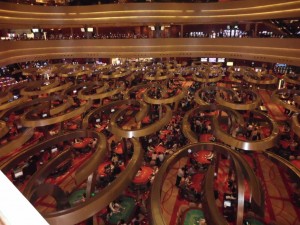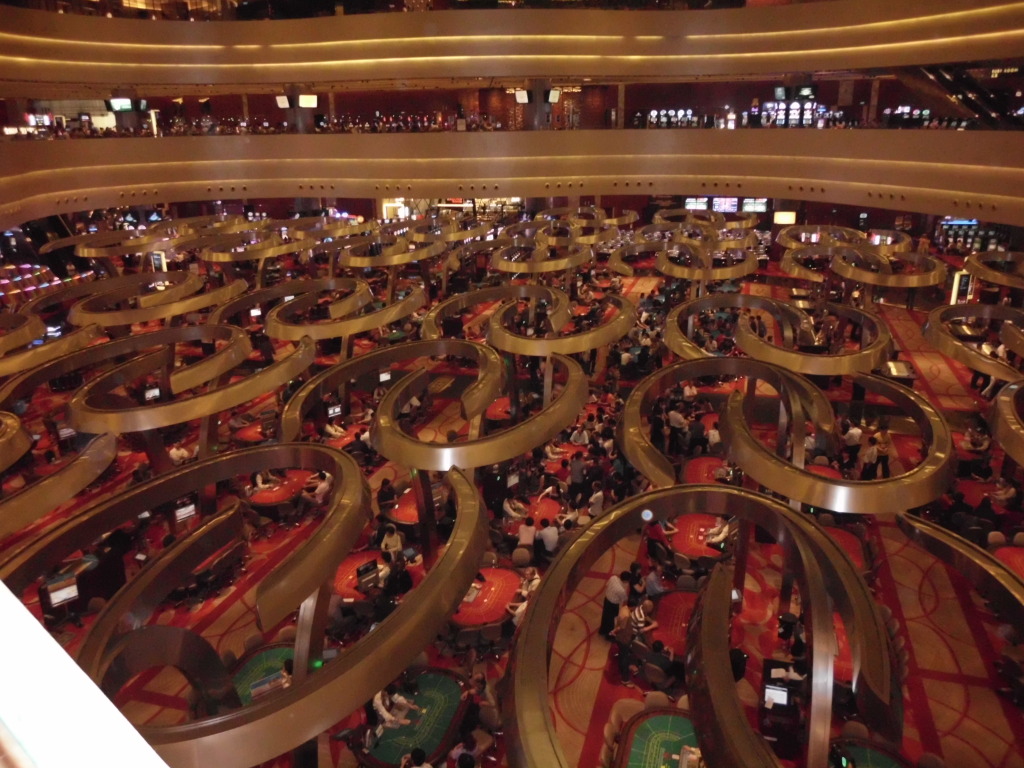The first thing you notice is the smell. As one of the few places that allows indoor smoking, Twin River Casino is infused with the odor of cigarettes. The casino, located in Lincoln, Rhode Island, was formerly a greyhound racetrack known as Lincoln Park. The name was changed to Twin River in 2007, and greyhound racing ended three years later as part of an agreement to help the casino emerge from bankruptcy. Twin River’s main attraction is now video lottery terminals.
This November, Rhode Island residents will vote on a ballot question to allow Twin River to add table games. According to the Providence Journal, Twin River has spent $1,655,564 to advocate for passage of this question, most visibly in a series of television commercials. For many people the gambling question is a moral one. But from a public policy perspective, is increasing gambling in Rhode Island good policy?

One researcher frames the debates over casinos as an issue of “economic boosterism” versus “social disruption.” In other words, are the economic benefits of a casino greater than its social costs? This would seem like a straightforward question best answered by cost-benefit analysis. Academics, however, can’t agree on an answer. One article, after reviewing the literature, concludes that the introduction of casinos does not increase the volume of crime. A more recent paper from the Brookings Institution argues that evidence indicates that “casinos do in fact impose negative social costs.” This paper finds some economic benefits from gambling, but also notes that casino siphon off money that would be spent on other local businesses.
This last point is key: despite what casino advocates might argue, gambling revenue doesn’t fall from the sky. Consumers who gamble are choosing not to spend that money on other things. For example, an increase in casino gambling might come at the expense of the Rhode Island Lottery, which contributes a higher percentage of its revenue to the state than does Twin River. Additionally, the social costs associated with gambling are often hard to quantify and even harder to directly associate with casinos. For example, it’s possible that banning gambling and driving it underground creates more social costs than legalized gambling.
According to a report from the University of Massachusetts Dartmouth, unlike most New England casinos, Twin River’s revenues have increased during the recession. In a recent survey, only 46% of Twin River patrons were from Rhode Island. Most of the remaining patrons were Massachusetts residents. The report speculates that the high cost of gas and the increasing prevalence of “stay-cations” has allowed Twin River to attract patrons who formerly went to more distant casinos, such as those in Connecticut. These trends might soon work against Twin River: Massachusetts legalized casino gambling last year and is developing plans for new casinos. One study found that by 2017 Rhode Island would lose $100 million of its yearly share of gambling revenue.
According to Twin River, the casino’s contribution to Rhode Island was around $270 million last year, which, a local paper notes, makes it the “third largest source of state revenues behind income and sales tax.” The casino contributes about $6 million to the town of Lincoln each year. Rhode Island has been especially hard hit by the recession: the state’s unemployment rate in July was 10.8%, while the nation’s unemployment rate is 8.1%.
My five-year high school reunion was recently held at Twin River. In contrast to the glamorous excitement portrayed in its commercials, I found Twin River to be a dark and dreary place. I think everyone would rather see signs of recovery in the construction of new high-rises rather than in smoky rooms filled with poker tables. But these feelings don’t change the reality of the situation. Twin River is already an established and growing institution in Rhode Island, and an important source of revenue for the state and the town of Lincoln. One academic notes that, in Nevada in 1998, only one-third of gambling revenue came from table games. While this in an imperfect comparison, it suggests that introducing table games at Twin River won’t lead to an explosion of gambling in Rhode Island. But table games might allow Twin River to compete with the coming Massachusetts casinos. This reality, combined with the fact that evidence of social disruption caused by casinos is ambiguous at best, suggests voters should approve the ballot question permitting table games at Twin River.

This is not just an economic issue. It's also an issue of racism. The question is whether it's fair for Twin River to be able to expand when the Narragansett tribe was denied the opportunity to start its own casino. There's a pretty strong case, that if casinos are now cool, then the Narragansett tribe is much more deserving of a casino than Twin River. Here's Chief Sachem Matthew Thomas discussing the issue:
http://www.wpri.com/dpp/on_air/newsmakers/newsmak…